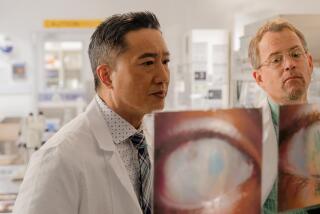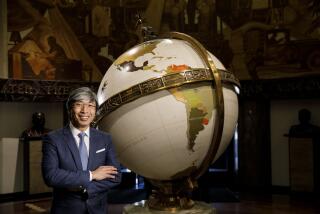One Country, One Book
- Share via
Edward Tian has been called China’s Bill Gates, its Steve Jobs. One Chinese journal went so far as to call him “Bill Gates and Steve Jobs rolled into one.” As co-founder of AsiaInfo, he helped build that nation’s Internet. Then in 2000, he left AsiaInfo for a government-funded start-up called China Netcom. Its mission: to create a broad-band network that would connect China, from its teeming metropolises to its most remote villages, to the global Internet via the fastest network on the planet.
“With our technology, enlightenment can flow through the taps like water,” Tian says. “When it does, it will enlighten our whole nation.”
Tian’s given name is Suning, an uncommon Chinese name that means “Remember Leningrad.” His parents met in Leningrad in 1954 at the Forestry Technology Academy. Returning to China in 1960, they were assigned to work as researchers at the Chinese Academy of Sciences. They married in Beijing in 1961; Tian was born two years later. He was sent to live with his grandparents in Shenyang because his parents had been assigned to a research institute in the far-off Gobi Desert.
Mao Tse-tung’s Cultural Revolution began in 1966 when Tian was 4. As foreign-educated intellectuals, his parents were denounced as “cow’s demon and snake spirit” and were sent to concentration camps. Tian remained with his grandparents, but their home was taken over by Mao’s Red Guard. When the Guard forced Tian’s grandfather to surrender his beloved collection of world literature to a bonfire in the frontyard, Tian tried to rip a book out of a soldier’s hands. “These are my grandfather’s!” Tian shrieked, but the guard knocked him to the ground.
There was no word from his parents and almost no food. Tian says that it was the dark age of his life and the dark age of modern China, characterized for him by a single emotion: hunger. “All I remember is hunger,” he says. “Hunger for food. Hunger for information.”
Approved writings--Mao’s works and volumes of Marxist propaganda--were the only books allowed during the Cultural Revolution. As Tian had witnessed, other books--”poisonous weeds”--were burned. As a result, he says that he had never been told any stories and had “nothing to give me a dream.” He says, “Without stories, I never learned to dream. I did not dream.”
When he turned 11, Tian became gravely ill. His parents, informed that their son was dying, were allowed to travel to Shenyang, where they took turns sitting by Tian’s bed in the hospital. One afternoon, his father pulled a book out from where it had been hidden under his coat and he began to read. The book was an old Chinese translation of Jules Verne’s “L’Ile Mysterieuse” (The Mysterious Island), originally published in three parts. His father had the first, “Shipwrecked in the Air.”
“‘Are we rising again?’
“‘No. On the contrary.’
“‘Are we descending?’
“‘Worse than that, Captain. We are falling!’”
It was the first story Tian had ever heard.
His father read the adventure of the escape from a Confederate prison in Richmond, Va., by five soldiers who had been fighting for the North in the American Civil War. They dramatically escaped in a hot-air balloon, but the balloon crash-landed on an island, where the men struggled to find food and shelter. The heroic soldiers miraculously survived.
So did Tian, who grew stronger as he vicariously lived life on the island, where the men, revitalized, prepared a feast of kangaroo soup and suckling pig. In the middle of the meal, one of the men let out a “cry and an oath.” When his friends asked what was wrong, the man replied, “I have just broken a tooth!” He drew from his lips “the object which had cost him a grinder” and discovered that it was not a pebble, as they expected. It was a leaden bullet.
His father closed the book. There was no more to read.
Tian was aghast. Who else was on the island? And for 10 years, he didn’t know whether these men lived or died. But he recalls, “I lay in the hospital bed and I dreamed. For the first time in my life. I dreamed of many possibilities. Before I had nothing to imagine, but my imagination had been ignited.”
All of China began to dream again, too, when the Cultural Revolution ended with the death of Mao on Sept. 9, 1976. The ascension of Deng Xiaoping was celebrated in the streets with drums and gongs. Deng “opened our eyes to the outside world,” Tian says. “It was like seeing for the first time after living your life in darkness.”
Tian had been a mediocre student, uninspired by the Mao-centric propaganda disguised as curriculum. However, he took to his studies with passion and seriousness and won a place at Liaoning University. The first week on campus, he went to the university’s reopened and replenished library.
“I searched for the second and third parts of ‘The Mysterious Island,’” he recalls. When he found them, he retreated to a corner table in the library and devoured them. Ten years of wondering what happened to the castaways was sated in a mere 10 hours. When he emerged from the library near midnight, he was exhausted and his hair stuck up like a mad scientist’s. But he felt exhilarated.
In 1987, Tian graduated from the university and was accepted at the prestigious Chinese Academy of Science in Beijing. China’s “opening-up period” was continuing at a thrilling pace, and Deng encouraged China’s best students to go abroad to continue their education. At 25, Tian left China and arrived at the University of Texas in Lubbock, where he answered an advertisement for housing and moved in with an elderly Texan who had never met anyone Chinese. Because it was difficult for the man to pronounce “Suning,” he began calling his boarder “Ed.” Later Ed asked to be called by the more dignified “Edward.”
Tian was extremely lonely in Texas when, one evening, he wandered into a dark basement on campus and found the deserted computer lab. He had never used a computer, but he sat down in front of a Macintosh and pushed a button. He would never forget what he saw: the Macintosh’s opening icon, a smiling face. “Without that smiling face, I may have shut off the computer and never come back,” he says. “The smiling face welcomed me into a new world.”
In spring of 1989, while he worked on his doctorate, Tian became preoccupied with events in China that were broadcast each evening on the news. Most nights the lead report was about an astonishing pro-democracy demonstration that had been growing in Tiananmen Square in the heart of Beijing. An open demonstration by hundreds of thousands, soon a million students! But on June 3, the government sent soldiers and tanks into the square. On the morning of the 4th, the unthinkable happened: They fired on the students. Hundreds, perhaps thousands, were killed.
The Tiananmen Square massacre so enraged most Chinese students who had been studying in America that they resolved to forsake China forever. Not Tian. He was determined to return. “I thought and thought after that,” he says. “How could I help the people of our country? It became the central purpose in my life.”
Drawn by his experience with the Apple Macintosh’s smiling face, Tian read a biography of the company co-founder, Jobs. He was riveted to an idea espoused by Jobs: that an entrepreneur, working outside the structures of established corporations or governments and inspired by a dream, had enormous power to change society. He also pondered Jobs’ idea that computers are not just computing devices but tools with the inherent ability to change lives.
A friend convinced Tian to attend a 1992 speech by vice presidential candidate Sen. Al Gore, during which Gore explained that an “information superhighway” could transform a nation. How? By elevating communication and knowledge--exactly what China needed. “Information! Access! That’s what we never had!” Tian says. “Information threatens the status quo. We hungered for information when we grew up. The Internet could give Chinese children access. It could connect them. They could visit any library in the world. They could talk to others, talk among themselves.”
The famous dissident Wei Jingsheng, after emerging from nearly 15 years of solitary confinement in a Chinese jail, once said: “People long for change, but they despair of it, so they go into business.” Tian, who earned his doctorate in 1992, turned to business but not because he despaired of change. The opposite: China was stuck in the past, while the rest of the world raced toward a new, as yet undefined, future. The overthrow of China’s system might seem like the only answer, but Russia’s post-Communist decline showed that it wasn’t enough. Besides, the Tiananmen Square massacre proved that protests were futile in China.
“I saw another way to change China and I thought that it might be effective,” says Tian. “It was a radical idea, but I became devoted to it.”
When his father read him Verne, Tian learned to dream. Now he became obsessed with a “big dream, a transforming dream.” It was a dream for China and a direction for his life. In 1993, he returned to China and built the country’s first Internet that was accessible to ordinary people. His next start-up constructed the world’s fastest and longest (twice as long as the Great Wall) high bandwidth network. Today, Tian helps run one of the nation’s most influential and largest companies with the power to bring state-of-the-world access to information and communication to hundreds of millions of Chinese.
The Chinese government occasionally attempts to censor and otherwise control the Internet, but information is flowing through the taps, if not yet like water. Thirty-five million people are logged on to the Internet in China. Though it is a tiny fraction of the nation’s 1.3 billion people, the number is doubling every nine months. The Chinese have what they never had: access to information, a voice and what once was a mysterious island itself has finally connected to the rest of the world.
More to Read
Sign up for our Book Club newsletter
Get the latest news, events and more from the Los Angeles Times Book Club, and help us get L.A. reading and talking.
You may occasionally receive promotional content from the Los Angeles Times.










